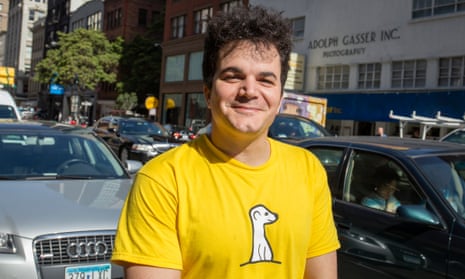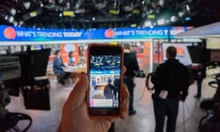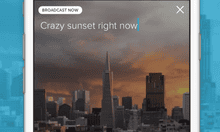Ben Rubin hasn’t had much sleep over the last few days, and his legions of newly acquired fans have noticed.
As the Guardian live-streamed an interview with Rubin, the founder and chief executive of hot new Silicon Valley app Meerkat, the most frequent comments from the audience of 51 people were along the lines of: “When was the last time Ben slept?”
To be fair to Rubin, others thought he still looked good. “Ben is HOT,” tweeted Ron Gura, who works at Meerkat’s biggest investor, the Israeli venture capital firm Aleph.
It has been a whirlwind couple of weeks for Rubin, a 27-year-old former architecture student from Israel. He launched Meerkat, which allows Twitter users to stream live video footage from their phones, on 27 February. Within days it was the talk of Silicon Valley, with everyone from famed venture capitalist Saul Klein to actor-turned-investor Ashton Kutcher and skateboard legend Tony Hawk “Meerkating” their lives. There are now more than 120,000 “Meerkaters”.
“It’s been 13 days,” Rubin said during the live-streamed interview, which was carried out on Thursday in the basement of Meerkat’s offices in San Francisco’s South of Market (SoMa) neighbourhood.
“We’ve had the Miami Dolphins [NFL team], American Idol … everyone using Meerkat. It’s, like, amazing brands are using it, people with access are using it – reporters, schools, churches doing services, real-estate agents doing showings of apartments.”
Rubin, whose team created Meerkat in eight weeks – almost accidentally as a side project to his Life On Air streaming service – said its aim was to help people share the most exciting or special moments of their lives with friends, admirers, fans or just about anyone who might want to watch.
“We believe that everyone has a story to tell,” Rubin says. “The luckiest person has one thing to tell every day and that’s awesome. If you’re less lucky you have [a story] two times a week.
“If I ask you if there’s something in your eyes that you think is wonderful to do in a shared experience in the next 24 hours, you probably will come up with one thing. It could be a wedding or going to a Kanye [West] show, or interviewing this person, or it could be going to the beach. It could be picking up a puppy to adopt – anything you think that is a powerful shared experience.”
Rubin said he did not care what users shared on Meerkat, and it is important that it is the user who decides what experiences are “awesome enough” to stream.
He says Meerkat is designed to encourage people to share experiences as they happen rather than taking pictures and boasting about them later on Twitter or Facebook.
“[It’s about] taking people that care about you with you, not taking a picture and [saying] here, look what I did,” he said. “It’s here, come with me. I want you to come with me to [technology and music festival] South by Southwest, not look how amazing my life was at South by Southwest.
“Only a few thousand people get to go to South by Southwest. There are probably a million people who are not going to South by Southwest and are interested in seeing some stuff from there. I think we can bridge that gap very easily.”
Rubin says that by using Meerkat, users are telling their followers: “This is something I feel special about … and I want you to come with me to this interview, I want you to come with me to the wedding. I want you to come with me to the apartment showing, or yoga, or class.”
The app has not just been used by friends sharing puppy and cat videos: journalists broadcasted President Obama’s speech at the 50th anniversary of the Selma to Montgomery marches last weekend, and Meerkat has been used to interview a senator.
“It’s a very honest medium,” Rubin said. “There’s a lot to do and we’re only just scratching the surface. The content will evolve from something that is one-directional to something that is two directional. The watchers – the consumers – will actually influence the content itself.”
Rubin said several celebrities have noticed the potential of Meerkat to directly interact with their fans, rather than doing so via TV channels. “A lot of their managers have been in touch. They want to have a relationship [with Meerkat]. They [know that they] can drive their fans crazy in a positive way with [Meerkat].”
He said Meerkat will also help bring people into the heart of politics, breaking news events, concerts and other events that can be hard for people to access in person.
John Ward, a political reporter at Yahoo News, interviewed South Dakota senator John Thune live on Meerkat from his office in Washington DC.
Rubin said Twitter had been very supportive of Meerkat, despite the app appearing to be a direct competitor to Periscope, a live-streaming app recently acquired by Twitter.
“We thought they might be agitated,” Rubin says. “But they have been holding our hands and helping us. They know that our intentions are good. They will play fair as long as we play fair.”
That relationship changed late on Friday night, when Twitter prevented Meerkat from accessing its social graph. That means Meerkat users will not be automatically connected to their Twitter friends with Meerkat.
“We are limiting their access to Twitter’s social graph, consistent with our internal policy,” a Twitter spokesperson said.
Rubin tweeted to complain about Twitter’s action. “[It’s] a sad day for the Twitter developer community who build amazing products that help us connect with each other,” he said.
Meerkat is likely to be the talk of South by Southwest, as Twitter was in 2007 and Foursquare in 2009, as investors and technology watchers seek out Rubin and watch the company’s curated Meerkat live-stream events.
Potential investors have come knocking. Rubin, who was dressed in a bright yellow t-shirt, jeans and plastic sandals, said investors were “all over me”. “I think I’ve archived around $500m [worth of investment offers] in my inbox,” he says.
Asked who the potential investors were, he replied: “Everyone you can think of … awesome people. Every email that I send back starts: ‘I cannot believe I’m writing these words to you because you’re my hero. I just can’t believe that I’m writing this email to you, but I’m swamped and we’re focusing on the community and I just can’t talk money right now.’”
Rubin said he was not going to sell out to the highest bidder: “It’s not about the money for us. We’re in this business to make an impact, not to be rich. It doesn’t make sense [to sell out] now; we haven’t [made] any impact.”
He said he owed it to his 11-person team to ensure Meerkat reaches its potential as an independent company. “Everyone in the team the last two years has been going to sleep and waking up knowing that they are doing something that’s going to be big. We deserve to carry on with our vision as much as we can and show what we believe in. Everyone is focused on creating something awesome and magical.”
Another reason for not accepting a takeover bid, Rubin said, is because he “just can’t work for another person”.
“I am unemployable,” he says. “I was at Intel. Everything seemed so broken. After six months, a year, you start to develop this hatred: ‘Why do I need to do that? It’s so stupid.’”
Realising what he has just said about one of the world’s biggest technology companies, Rubin added: “By the way, they [Intel] give amazing conditions, and perks, and great salary and everything.
“I [just] wanted to do so much stuff to make the process better. Big organisations are very slow.”
If he’s not a good employee, is he a good boss? “I have no fucking idea.”
We asked the Meerkat employees watching the live stream if they thought Rubin was a good boss. No one replied either way.








Comments (…)
Sign in or create your Guardian account to join the discussion